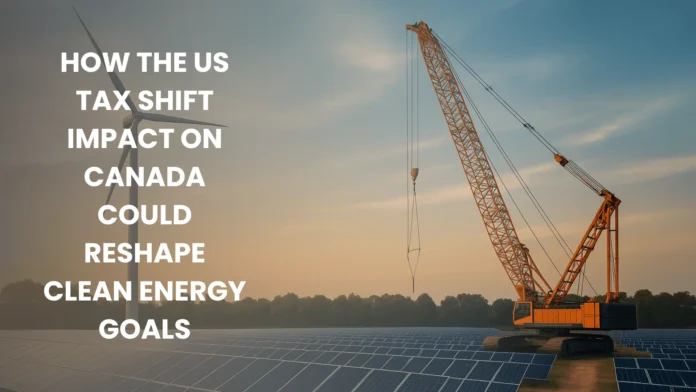A Disruptive Tax Shift Across the Border
The US tax shift impact on Canada is more than just a fiscal policy change—it’s a shockwave rippling through climate goals, green infrastructure, and industrial cooperation. With the recent passing of the “One Big Beautiful Bill Act,” Washington has rolled back clean-energy incentives and EV credits, triggering alarm bells for policymakers and industry leaders north of the border.
What seemed like a coordinated North American movement toward a greener future is now splintering. Unions forecast millions of jobs at risk. Canadian automakers are rethinking battery plant expansions. And climate policy experts say the change could stall years of environmental progress.
What the US Bill Actually Does
Clean‑Energy Tax Credits Eliminated
As part of the Inflation Reduction Act under Joe Biden, homeowners and developers had access to major credits for solar installations, battery storage, heat pumps, and energy efficiency upgrades. These incentives drove upwards of $30 billion in clean‑energy investments by 2024. But the new Republican-led legislation strips these credits by the end of 2025. There is now a strict timetable for large wind and solar projects: building must start within a year after adoption and operations must begin by the end of 2027, or else all federal subsidies would be lost.
EV Tax Credit Disappears
Clients buying new EVs previously received up to $7,500, and used EV buyers got $4,000—part of a broader push to meet zero-emission vehicle targets. With the credit expiring this September, EV sales may stall in both the US and Canada, since Canada—linked via North American supply chains—relied on this boost.
Why Canada Is Particularly Vulnerable
A Disappearing Carbon Cohort
At one point, Canada and the US were moving in tandem on climate law. According to UBC’s George Hoberg, the bill “interrupts whatever delicate momentum we had toward stronger climate policy and a clean‑energy transition.” The risk isn’t just symbolic; it could stiffen domestic political will in Canada.
Industrial Shockwaves
North America’s Building Trades Unions have issued a stark warning: the legislation could wipe out as many as 1.75 million jobs across the US and Canada. Sean McGarvey, the union’s president, drew a vivid comparison, calling it “the modern-day equivalent of cancelling over 1,000 Keystone XL-sized projects in one stroke.” This worry was mirrored by the Laborers’ International Union of North America, which warned that many good-paying, shovel-ready positions might never be realized.
EV Ecosystem at Risk
When Canada secured inclusion in IRA-style incentives for North American EVs, it helped propel investment in Ontario battery plants. Now, uncertainty is causing automakers to pause or retract these plans. Joseph Calnan, energy-policy analyst, warns: “Getting rid of the US tax credits […] has big implications for Canada on the idea of an integrated EV supply chain.”
Canada’s Strategic Pivot
Opportunity Meets Challenge
With US incentives gone, Canada can position itself as a haven for clean‑energy investment—particularly in AI‑powered data centers powered by hydropower. These could attract tech giants seeking lower-carbon footprints, according to Hoberg.
Yet, Canada cannot replicate US-style solar or wind capacity easily—many US regions simply receive more sun and wind resources. Calnan also cautions that high tariffs and uncertain markets may deter relocation plans.
Policy Innovation in Ottawa
Canada’s Liberal government, while echoing the “energy superpower” vision, has pursued an “all‑of‑the‑above” energy policy—embracing renewables, critical minerals, pipelines, and carbon capture. Alberta Premier Danielle Smith’s proposed $16.5‑billion carbon-capture project and simultaneous West Coast pipeline exemplify this dual approach.
Final decisions are pending, but Ottawa is fast-tracking “nation‑building” projects that layer fossil fuel infrastructure with clean‑energy and extraction of key minerals. The aim is to diversify energy while maintaining environmental accountability.
Economic & Trade Levers to Consider
Tariff and Treaty Tactics
Canada could consider easing counter-tariffs on US goods to lure investment. Coupled with Canada’s aggressive countermeasures against Chinese tariffs—or realigning supply chains away from China—this could create a magnetic green-industrial opportunity.
Pivoting to Global Partners
Hoberg suggests Canada may deepen climate partnerships with Europe and Asia. Doing so could reduce reliance on US policies and anchor Canada in new climate‑aligned trade corridors.
What Lies Ahead?
- Green jobs on thin ice. In the absence of prolonged incentives, sustainable energy projects might fail, costing Canadians investment and jobs.
- EV adoption falters. EV mandates may stall along the supply chain, undermining zero‑emission targets.
- Canadian advantage in hydropower. Shifting capital toward hydro-backed data centers could mark a turning point—but only if Canada proactively promotes it.
- Forging global climate alliances. Looking south may no longer be sufficient; Canada may increasingly look to Europe and Asia as strategic allies.
How Stakeholders Can Act
- Advocacy matters: Canadians need to urge political leaders to ensure continuity of clean-energy incentives and bolster domestic EV mandates.
- Industry-university collaboration: Joint efforts between academia and business—especially in grid integration and carbon capture—can spur innovation.
- Export clean energy know-how: Canadian companies can leverage their expertise in small modular reactors (SMRs), carbon capture, and critical mineral processing.
- Leverage tax policy creatively: Craft Canadian incentives for both domestic and foreign investment—if the US won’t, Canada must.
Closing Thoughts
The US tax overhaul isn’t just an American story—it’s a North American turning point. While the cuts threaten jobs, climate progress, and industrial coordination, Canada also has a vital opportunity: to step forward with tailored incentives, strategic partnerships, and a bold stance on green energy. The watershed moment is now—someone has to lead. Could that be Canada?


